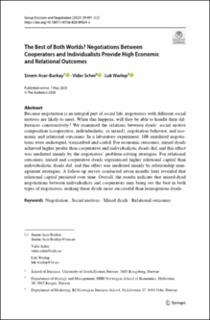The Best of Both Worlds? Negotiations Between Cooperators and Individualists Provide High Economic and Relational Outcomes
Journal article, Peer reviewed
Published version
Permanent lenke
https://hdl.handle.net/11250/2655531Utgivelsesdato
2020Metadata
Vis full innførselSamlinger
- Publikasjoner fra CRIStin - BI [1015]
- Scientific articles [2181]
Originalversjon
Group Decision and Negotiation. 2020, 29 (3), 491-522. https://doi.org/10.1007/s10726-020-09669-zSammendrag
Because negotiation is an integral part of social life, negotiators with different social motives are likely to meet. When this happens, will they be able to handle their differences constructively? We examined the relations between dyads’ social motive composition (cooperative, individualistic, or mixed), negotiation behavior, and economic and relational outcomes. In a laboratory experiment, 108 simulated negotiations were audiotaped, transcribed and coded. For economic outcomes, mixed dyads achieved higher profits than cooperative and individualistic dyads did, and this effect was mediated mainly by the negotiators’ problem-solving strategies. For relational outcomes, mixed and cooperative dyads experienced higher relational capital than individualistic dyads did, and this effect was mediated mainly by relationship management strategies. A follow-up survey conducted seven months later revealed that relational capital persisted over time. Overall, the results indicate that mixed-dyad negotiations between individualists and cooperators may bring out the best in both types of negotiators, making these dyads more successful than homogenous dyads.

